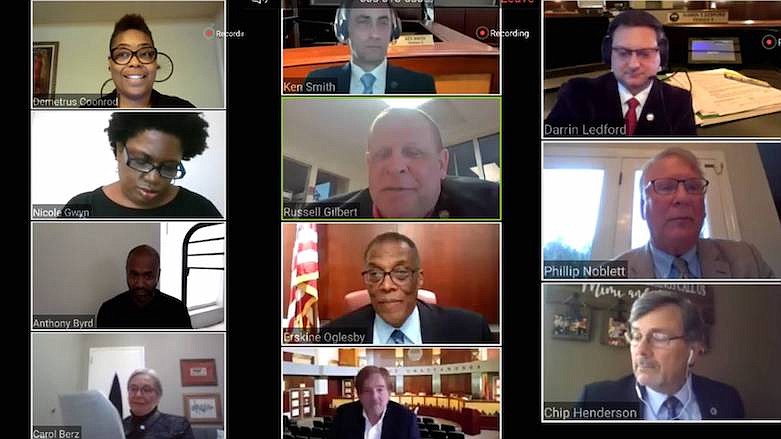The Chattanooga City Council's first virtual meeting amid social distancing highlighted some of the perils of online public meetings as online attendees used racist hate speech in the chat and council members debated transparency protocols amid the COVID-19 public health crisis.
The two-hour meeting addressed several regular business and state-of-emergency topics with limited technical hurdles, but stumbled early on as three people in an online chat sent dozens of racist messages targeting black council and staff members.
In the span of the first 10 minutes, more than two dozen messages reading "I HATE N --" and similar messaging flooded the public chat with more than 90 uses of the racial slur.
Multiple council members responded with shock, imploring that someone curb the "extremely offensive" messages that were visible to the more than 80 online viewers of the meeting as well as the council members and city staff.
"It was an unfortunate part of the meeting, and we had to figure out what exactly to do when they were coming in," said District 3 Councilman Ken Smith, who steered the council's use of the video conferencing app Zoom. "When those kinds of comments were coming through, those people were just removed from the meeting. But the thing about Zoom is you can't prevent people from joining, nor would I ever advocate for us keeping people out of the conversation, so we're going to have to figure out the best options for preventing this."
Smith was able to curtail the behavior by changing the chat to allow members of the public only to message the council and other participants, rather than making the chat visible to external viewers. According to Smith, no more negative messaging came in after that change.
Chat was disabled before the council unanimously voted to approve a resolution formally recognizing Juneteenth, the holiday that celebrates the abolition of slavery and emancipation of slaves in formerly Confederate U.S. states, preventing any such messaging from appearing during that recognition by the council.
Beginning next week, the council will allow more official public comments on virtual meetingsas it adjusts to the need to maintain social distance to avoid the spread of coronavirus. Smith says the city has not ironed out the details just yet, but Tuesday's outburst demonstrates the importance of getting that process right.
"That was the extent of the control measure put in place so that they would not go out to the general public. I can't say that stops someone from coming back to the meeting, though," he said. "We do not have the ability to see any identifying information about the attendees, so that's something we'll have to address before we allow speakers, given our existing rules."
At typical council meetings, public comments are allowed after the council business is complete under certain restrictions, including requiring all speakers to give their name and address before addressing the council. The online comments on Tuesday did not feature verified names of those posting.
Council members discussed this process and other procedural and accessibility topics during the meeting, asking City Attorney Phil Noblett to make the panel's public comment rules clear to participants for next week's meeting.
Chairman Erskine Oglesby said after the meeting that the outburst would not affect the council allowing public comment.
"It's a shame people act like that, but no, it will not change that we will offer public comment next week," Oglesby said. "We will make sure that we have the technology in place to allow public comment and the rules in place to keep it under control."
During the meeting, some staff members not listed as participants were given permission to "raise their hand" and participate in parts of the discussion, as they would usually by approaching the microphone, giving a glimpse at how the council could practice discretion in allowing verbal comments from the public.
"With this being the first meeting, we've clearly got to work a few kinks out and it's just finding the right way to handle things, but we saw a little of that tonight," Smith said, suggesting the council use that same function to allow public comment. "I would like to think that that type of behavior is over, but we will have the ability to allow comments and remove those privileges at certain times of the meeting."
Contact Sarah Grace Taylor at staylor@timesfreepress.com or 423-757-6416. Follow her on Twitter @_sarahgtaylor.
